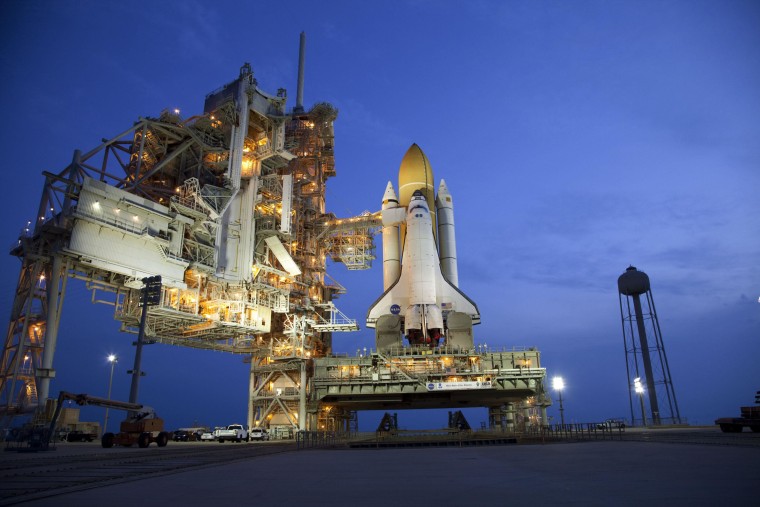CAPE CANAVERAL, Fla. —While NASA considers competing bids to take over a shuttle launch pad at Kennedy Space Center, it's adding three mobile launch platforms to its list of excess equipment available to private industry, officials said Tuesday.
Ideally, NASA wants a commercial launch company to take over one or more of the massive steel platforms, which were originally built in 1967 to support the Apollo moon program's Saturn rockets. The 25-foot-tall (7.6-meter-tall) platforms were later modified for the space shuttles, which flew from 1981 until 2011.
Recycling the platforms, which measure 160 feet by 135 feet (50 by 40 meters) is another option, a solicitation on NASA's procurement website shows.
The U.S. space agency also is interested in other uses for the mobile launch platforms, which served as bases to stack and assemble the shuttle and then transport it to the launch pad. The platforms provided power and umbilical connections and had open sections for flames and rocket exhaust to pass through.
"At this point, NASA is looking to gauge interest for potential use of the (platforms) and concepts for potential use," spokeswoman Tracy Young said.
Proposals are due Sept. 6.
Bids from billionaires
NASA is already assessing bids for the shuttle launch pad from two competing firms backed by billionaires.
NASA is also turning over the shuttle's runway to Space Florida, a state-backed economic development agency. Space Florida, in turn, plans to make the runway and support facilities available to a variety of commercial companies — including privately owned XCOR Aerospace, which is developing a two-person, suborbital spaceship called Lynx that takes off and lands like an airplane.
Another potential customer is Stratolaunch Systems, an orbital space vehicle backed by Microsoft co-founder Paul Allen.
The most contentious — and highest-profile — piece of shuttle equipment available is a Kennedy Space Center launch pad that has attracted competing bids from Amazon.com founder Jeff Bezos and Elon Musk, a dot-com billionaire who founded SpaceX and heads the electric car company Tesla Motors.
Bezos and Musk are vying for Launch Complex 39A. NASA intends to keep the second shuttle launch pad, 39B, for a new heavy-lift rocket under development called the Space Launch System.
California-based SpaceX wants 39A to launch its Falcon 9 and planned Falcon Heavy rockets. The privately owned firm already flies from a leased launch pad at Cape Canaveral Air Force Station, located just south of Kennedy Space Center.
The first Falcon 9 rocket flight from a new launch site at Vandenberg Air Force Base in California is scheduled for next month. The company has a backlog of more than 50 launches, including 10 missions to fly cargo for NASA to the International Space Station.
SpaceX also is developing a version of its Dragon cargo ship to fly astronauts.
Blue Origin's backers
Bezos' rocket venture is Blue Origin, which is based in Kent, Wash. Blue Origin submitted an alternative proposal to NASA to run Pad 39A as a multi-user facility.
Both firms say they are ready to take over maintenance and operations of the launch pad on Oct. 1.
United Launch Alliance, a partnership of Boeing and Lockheed Martin, did not bid on the shuttle's launch pad but has publicly endorsed Blue Origin's proposals. The company, which has a lucrative monopoly on launching U.S. military satellites, is facing its first competition for the business from SpaceX. (Some observers see ULA's support for Blue Origin's bid as a gambit primarily aimed at thwarting SpaceX.)
The main NASA facilities that will remain are Launch Complex 39B, plus various hangars for the Orion deep-space capsule that's to be launched by NASA's heavy-lift rocket. Orion and the Space Launch System are due to begin test flights in 2017.
More about Kennedy Space Center's future:
